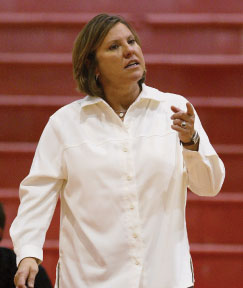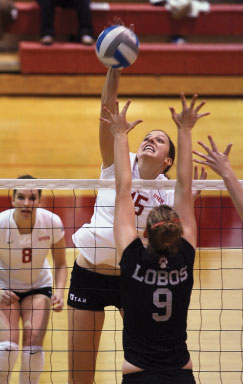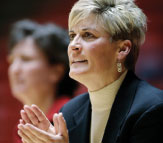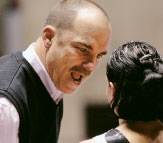
|
|
About Continuum Advertising Advisory Committee Archives Contact Us Continuum Home Faculty/Staff Subscribe related websites Alumni Association Marketing & Communications University of Utah Home |
 T T
SidelinesA Tale of Two CoachesBeth Launiere and Rich Manning have cultivated two of the best teams in the history of women’s athletics at the U. by John Youngren Men’s sports like football and basketball may get the headlines, but during fall 2006 at the University of Utah it was a pair of women’s teams—specifically, the volleyball and soccer squads—that were breaking records and generating success on their way into the second round of their respective NCAA tournaments.
Then again, impressive regular season performances, individual achievements, coaching honors, and consistent play have become trademarks of two of the U’s leading but (somewhat) lesser-known coaches—volleyball’s Beth Launiere and soccer’s Rich Manning. “All coaches have their own style and approach to the game and to their teams, but the commonalities of successful coaches are when their players do what’s expected of them when they’re expected to do it,” says Chris Hill, Utah’s director of athletics and special assistant to the president. “[Launiere and Manning] are similar in that they pay attention to their players in every facet of the sport, and they strive for excellence in every way.” The Communicator For the U of U women’s volleyball team, 2006 will be remembered as particularly dramatic: The Utes put together a record-breaking 27-3 season (16-0 in Mountain West Conference play; 12-0 at home), which included a phenomenal 25-game winning streak (the old Utah record was 12 straight games) that amped up both the publicity and the pressure.
The team finished the season with school records in wins (28), conference victories (16), and overall winning percentage (.875). Pretty heady results, even if it all ended at the NCAA tournament with a first-round win over Michigan State before a disappointing second-round loss to UCLA in Los Angeles in early December. “It took a little time [to put that disappointment behind],” says Launiere, who just finished her 17th year as Utah’s coach. “We felt we could go deep into the tournament. And you need to beat top teams like that if you want to be able to be a team like we want to be.” Still, the Utes—once ranked as high as No. 9 in the nation—did everything but win that final game for Launiere, who was later named Tachikara/AVCA Division I West Region Coach of the Year for the second time in her career. “I really have to say ‘Thank you’ to the players,” says Launiere. Indeed. When all was said and done, five U of U volleyball players were honored by the AVCA, including former Alta High School star Sydney Anderson, who was named Freshman of the Year. Her fellow spikers—Airial Salvo, Emillie Toone, and Whitney Webb—were each named to the All-Region team, and sophomore star Lori Baird was named to the All-Region honorable mention team.
“These awards are a reflection of the tremendous season we had and the hard work we put into it,” says Launiere. Though she’s been doing this for a while (“I started as the youngest coach in the conference and now I’m the oldest,” she jokes), Launiere says what makes her most effective as a coach is “always finding something new” in each year’s team, and her efforts to serve as a mentor and role model to her young players. “I think I’m a good communicator,” the coach says. “I do a good job of getting a lot of people to buy into the vision of this program. And I think I have a pretty good relationship with my players” (all of whom will be back next year, as the Utes had no seniors on the squad in 2006). “I’m very proud of this team,” says Launiere, who has taken nine straight groups to the NCAA Division I Tournament and won five Mountain West Conference (MWC) titles with the program she’s built as Utah head coach (she has a 350-191 career record at the U). And—while she finished with 20 or more wins for her 11th straight season as U of U head coach—Launiere says that the second-round NCAA tournament loss (the seventh time in her career she’s led a Utah team to the second round) may be the motivator she needs to boost her talented group to a new level. “[The NCAA] forced us to really look at what we have to do to improve,” says Launiere. “It’s kind of a mixed blessing. We didn’t reach all the goals we wanted, but it’s so exciting to know it is in our hands to try again.” The Builder Under fifth-year coach Manning, the women’s soccer team made its fifth-straight appearance in the NCAA tournament, capping a 15-4-1 regular season and MWC tournament championship by playing host for the NCAA’s first and second rounds. The Utes won a wild double-overtime victory over Idaho State in the first round of the tourney before finishing their season with a frustrating 3-0 loss against defending NCAA champion Portland in the tournament’s second round, played at Ute Field in Salt Lake City. “Every coach in every sport strives to be in an NCAA tournament, and in that case, only one team can leave as a winner,” Hill says. “We strive to win every league championship and do some damage in every NCAA tournament. It’s exciting for me to watch [Utah teams] go through that all year, and I appreciate what they’ve done.” From that standpoint, the 2006 season “was the most challenging we’ve had,” Manning says of his 16-5-1 team (including NCAA appearances) and its accomplishments. “Not only were we able to win a lot of games and score a lot of goals, but we played a high level of soccer that was fun to watch.” Four members of the Utah women’s soccer team were named to the 2006 NSCAA/adidas All-West Region Team, including first-team honors for sophomore forward Adele Letro and senior goalkeeper Ashley Mason, second-team honors for senior forward Amanda Feigt, and third-team honors for senior defender Melissa Wayman.
The Utes tied a school single-season win record with their first-round NCAA victory. And Manning finished his fifth season as coach of the team with a 72-24-10 overall record, which includes NCAA tournaments in each year, as well as MWC regular season championships in 2003, 2005, and 2006. For Manning, who built the women’s soccer team largely from scratch five years ago, the success has been particularly gratifying. He was named MWC Coach of the Year for the second straight season. “I’m most pleased that our seniors—the first group of kids I recruited—all had great seasons,” he says. “They all showed a lot of faith in me [when being recruited]. We didn’t have a lot to go on at the time. For them to say ‘I believe in this school’ and commit to the U was something.” And unlike Launiere, whose entire elite group returns next year, Manning will have the challenge of replacing several of his core players in 2007. “We’ll be integrating [at least] six new players, which will be a challenge,” Manning says. “But I’m very excited. I honestly think that we might have a deeper team next season than we had [this past year]. I’m excited about integrating the changes and keeping up the high standard.” So yes, while Manning was disappointed with his team’s failure to advance beyond the NCAA’s second round (“As a competitive person, I’m never going to be satisfied until I’m holding up the NCAA trophy,” he says), he was also able to put it in perspective: “We had a really good season. I can’t minimize the fact that we did as well as we did.” And that perspective seems to sum up the success enjoyed by both women’s volleyball and soccer in 2006—record-setting seasons marked by competitive successes, post-season honors, top player performances, and positive recognition, both on campus and far beyond. “Coaches like Beth and Rich are a great complement to our program,” Hill says. “They’re valued, what they do is important, and we’re going to work hard to make sure they know that.” “The disappointment of losing at the end of the year never really completely leaves you. It never does,” Manning says. “But we did really well. Lots of people came and enjoyed watching us. We achieved a lot of team goals. And we won a lot of games.” Spoken like a guy who’s planning to win a lot more. —John Youngren BA'88 works in advertising for Love Communications in Salt Lake City and has written many previous articles for Continuum. A Notable Year
A pair of University of Utah coaches make the record books. Sometimes, sports are all about the numbers. And for a pair of U of U coaches, the magic numbers for the 2006-2007 season were 500 and 850. During a career spanning 24 years at the U, women’s basketball coach Elaine Elliott has become something of a legend in the sport. In ’05-’06, she guided her team to the Elite Eight, demonstrating that Utah women’s basketball had matured to become one of the best programs in the nation. And in early 2007, Elliott chalked up a victory that would put her in the record books: With a win against Colorado State in January, she joined an exclusive group of coaches in college athletics, becoming only the 32nd NCAA Division I women’s coach to hit 500 wins. Meanwhile in gymnastics, coach Greg Marsden racked up win number 850 in a meet against Washington in mid-January. Marsden is the most successful coach in college gymnastics history, and has spent all 32 years of his stellar career at the U. He has led Utah to 10 national championships, and his team has never placed lower than 10th in the nation. Since 1976, Marsden’s first year at the U, the Red Rocks have qualified for every national championship. And it looks like Marsden may hold his record for some time to come. The next winningest coach is Georgia’s Suzanne Yoculan, with 745 victories. |





